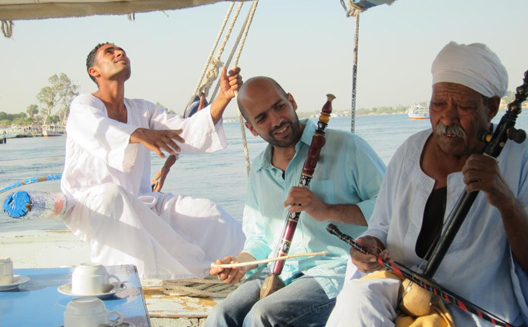Can Cultural Entrepreneurship Soothe Political Strife? The Nile Project Unites East Africa with Music


Typically we think of entrepreneurship as the creation
of new businesses, but working to change public opinion could be
called cultural entrepreneurship, a service not directly related to
a product or a service but to the way people see each other and how
they look for ways to change their reality.
For that reason, in August 2011, Egyptian ethnomusicologist Mina
Gerges and Ethiopian-American singer Meklit Hadero founded
The Nile
Project, a cross-cultural musical dialogue tha evokes the
African river as a symbol of the common ecosystem uniting the Nile
Basin countries.
The goal is to raise awareness about recent political conflict over
the waters of the Nile River.
"We need cultural awareness about the conflicts over Nile water
distribution, which has been ongoing for several years without any
political solution," says Gerges. "The relationship between Egypt
and Africa isn't clear; we still think that we aren't an African
country. We have to start changing this
perception."
Uniting the Nile Countries
While there's a historical lack of cultural relation between the 11
Nile basin countries (Democratic Republic of Congo, Burundi,
Rwanda, Uganda, Tanzania, Kenya, Ethiopia, Eritrea, South Sudan,
Sudan and finally Egypt), in which 400 million people share the
second longest river in the world, Gerges and Hadero hope to engage
their neighbors and change behavior, with music.

Mid-February, the co-founders of the Nile project gathered 20
musicians from Egypt, Sudan, Nuba (both from Egypt and Sudan),
South Sudan, Eritrea, Ethiopia and Uganda, and brought them to
Aswan to perform songs about the Nile, poverty, peace, love and
war, in order to spread their art among their neighbors.
As the musicians formed groups and composed new songs, they worked
to unit the Nile basin culturally and musically, playing "Nile
compositions" combining different styles and instruments from
across East Africa.
While political problems still appear every now and then, Mina
considers music a way to solve all disputes. It can be difficult to
draw the public attention when internal political conflicts persist
and everyday concerns could limit the desired impact.
But, by building a network of consultants and specialists in
politics, education, music and social entrepreneurship, Gerges
is working to create individual messages adapted to the public
in each of these 11 countries, speaking directly to their
interests.
Expanding Cultural Entrepreneurship
Initially, Gerges developed the idea for the project came after
attending an Ethiopian music concert in San Francisco; it seemed
ridiculous to him that he had traveled all the way to the U.S. to
hear Ethiopian music, and never listens to it in Egypt, despite the
fact that both countries are geographically close.
In keeping with the goal of uniting the region, the Nile Project
plans to organize a Nile tour in 2014, in which musicians and
environmental educators will sail down the river from the
Mediterranean to Aswan in 35 days, on a boat made of recycled
water bottles. Along the way, they will perform concerts and give
workshops to teach the local public about the Nile's cultural and
environmental fabric. This tour will be accompanied by the launch
of a web-based dialogue platform for sharing ideas and Nile stories
via live discussions and short videos.
In the future, Gerges is also planning a Nile festival in
Washington, D.C. in summer 2016, and the creation of a
multidisciplinary curriculum for children exploring culture,
history, and geography and encouraging small social projects.
The Nile Project, says Gerges, works as the "missing link" between
culture and development since these projects often lack a cultural
dimension. By uniting the two, he hopes "cultural entrepreneurship"
will take off.


